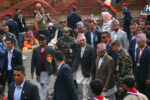KATHMANDU: Nepal will witness on December 26 an annular solar eclipse, where the Sun appears as a ring (annulus) around the Moon. A solar eclipse is a natural phenomenon that occurs when the Moon comes between the Sun and the Earth.
This annular solar eclipse will also be visible from Saudi Arabia, Qatar, United Arab Emirates, Oman, Sri Lanka, Malaysia, Indonesia, Singapore, Northern Mariana Islands, and Guam.
The partial eclipse will begin at 8:43 a.m. when the moon ‘touches’ the sun’s edge, and at 10:01 a.m. the annular phase will start and the full eclipse would be visible. By 11:00 a.m. the full eclipse will end, and by 11.31 a.m. the moon will leave the edges of the sun, ending the partial eclipse.
The total eclipse will last for 3.12 minutes. “The eclipse will start in Qatar, the UAE, Oman and due to its geological positioning.
It is not advisable to look at the Sun during a solar eclipse with naked eyes. Only eclipse glasses that have a certification with “ISO 12312-2 international standard” are safe for use, according to NASA.
Other options are the number 14 welder’s glass or a pinhole projector that allows a user to project the image of the sun on paper or cardboard.
It is safe to eat, drink and carry out your daily activities during an eclipse.








Comment